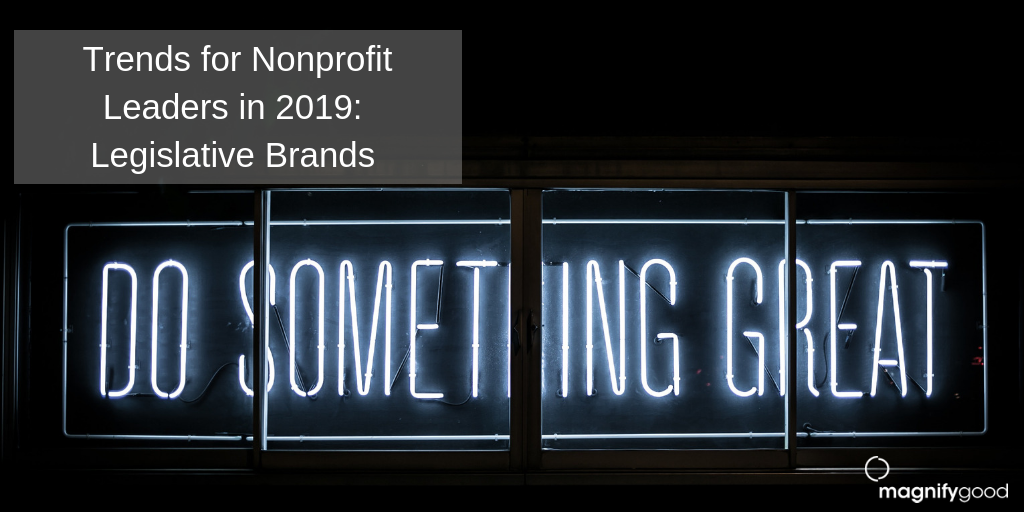Each one of us fosters a core truth — a passion that inspires us to take meaningful action. For years, philanthropy has had the sole responsibility of facilitating those desires to create positive change. A decade ago, the idea that brands needed to engage in political activism to maintain or increase sales would have humored marketers. In 2019, giving back has become a cross-sector responsibility.
Today, 86 percent of consumers believe companies should take a stand on social issues. This concept, known as “legislative brands” is number one of five consumer trends for 2019 reported by TrendWatching.
Our behavior as consumers has changed drastically. In today’s world, our expectations of corporations and organizations have become increasingly more demanding. With increased access to information about the issues and challenges affecting our world, we have become conscious consumers and supporters — demanding transparency and authenticity from brands and corporations.
Consumerism is taking a more socially-conscious, philanthropic approach. Brands are having to rethink strategy to engage and maintain loyal customers and supporters. The digital age has created an endless feedback loop between brands and consumers, allowing a deeper understanding of how passionate people are about creating change. The emergence of this trend presents an opportunity for the philanthropic sector to connect and partner with legislative brands.
As individual trust in big business and government deteriorates, more consumers will continue looking to brands to affirm their values. Leaning into advocacy provides an emotional connection to a brand, driving consumers and producing brand advocates. Through partnership with philanthropy, brands and corporations have secured loyal customers in addition to gaining new ones, all while strengthening and expanding philanthropy’s impact.
Cross Sector Collaboration to Make a Difference
Outdoor gear and clothing brand Patagonia embodies the concept of legislative brands, even referring to itself as “The Activist Company.” The company is a member of 1% for the Planet, an alliance of businesses that have committed to donating 1 percent of total annual sales to grassroots environmental organizations.

In 2016, Patagonia announced its commitment to donate 100 percent of its global Black Friday revenue to “grassroots organizations working in local communities to protect our air, water and soil for future generations.”
Deepening its relationship with consumers, Patagonia’s authenticity inspired individuals to support the brand’s mission. The company reported record-breaking sales, reaching $10 Million dollars — all of which was donated to grassroots environmental organizations.
Gillette, one of the leading brands for razor and personal care products instantly embraced this trend for 2019 — kicking the year off with its “The Best A Man Can Be” campaign. In the wake of movements like #MeToo, Gillette decided that it has a responsibility to make sure the brand is “promoting positive, attainable, inclusive and healthy versions of what it means to be a man.”
Furthering its commitment through cross-sector partnership, Gillette has pledged to donate $1 Million dollars per year to nonprofit organizations that focus on inspiring and educating men of all ages to be the best they can be. The campaign ad went viral, spiking sales and online engagement for the brand and in turn, organizations who do the groundwork to mirror this mission will be able to strengthen impact.
Philanthropy in The Year Ahead
Philanthropy is on the edge of two revolutions. One is a technology revolution — the other is a monumental shift in how people choose to give. As professionals in the sector, we’re at the frontline of both of these paradigm shifts, facing more opportunities than challenges.
Years of working with the social sector has taught us that creating deep, meaningful connections is the key to maintaining and generating support. The inherent human need for authenticity that aligns with our deepest held values is what motivates our behaviors and expectations.
Creating connections gives us the opportunity to understand how others view the world and helps us connect with their passions. When we strive to connect people to their passions, it produces stories of their values and who they are.
Connecting deeply with individuals and connecting them to their purpose and passion has solely been the responsibility of philanthropy. As the demand for CSR becomes more prominent in today’s society, philanthropy can share this responsibility with corporations and brands through partnership. Partnering with corporations and brands will drive deeper connections with their consumers, while increasing support and maximizing impact for philanthropy.



